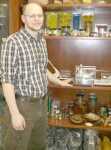MCC instructor seeks birds for teaching collection

McCOOK, Nebraska -- McCook Community College science instructor Rob Bogardus has started a teaching collection of bird specimens and he's looking for the public's help in adding to that collection.
Millions of birds die every year when they run into windows, get hit by vehicles or are killed by household pets. Since it is illegal for anyone to keep or possess bird remains without a permit, Bogardus said that if someone finds a dead bird in good condition, he hopes they will keep the college in mind.
"If someone finds a dead bird, contact me, I'd like to have it for our collection," Bogardus said. His telephone number is (308) 345-8150.
So far the MCC collection includes a couple of Great Horned Owls, a sharp-shinned hawk, three robins, a Western Kingbird, a house sparrow and a red-bellied woodpecker. However, Bogardus said just because he already has one species doesn't mean he's not interested in obtaining multiple specimens.
Bogardus said the best way for him to preserve a sample is to collect it with gloves or a plastic bag, and then place it in a plastic storage bag and freeze it.
"We won't be able to use anything mangled, half-eaten or rotting," he said, and noted that neither he nor anyone from the college will be killing birds for the collection. "We're just taking the opportunity to let the public know that if someone finds a dead bird in decent shape, we can put them to good use and prevent them from going to waste."
Bogardus, in his second year at MCC, has a master of science degree in integrated biology and a bachelor of science degree in conservation biology, both from Brigham Young University.
He worked on his doctorate in biological sciences at the University of Wisconsin-Milwaukee, is an ornithologist and has published numerous articles in a variety of professional journals. His professional affiliations include the American Ornithologist's Union, Animal Behavior Society, Ecological Society of America, and the Society for Integrative and Comparative Biology.
The MCC science instructor said he worked as an assistant taxidermist at a living history museum in a college where the students had access to hundreds of museum-quality specimens.
"So my motivation for this is that [because] I was a student, I know that having specimens right in front of me -- to see and touch -- greatly augments learning science and it made biology accessible and fun." Bogardus said. "And I want to give our students at MCC that same opportunity."
Having a teaching collection of bird specimens is not common for most colleges the size of MCC, but Bogardus said that now since the process is in place, state and federal permits have been obtained, and the college has a specimen freezer -- adding to the collection is simple matter of finding the samples and doing the taxidermy.
The process of preparing samples includes, thawing the samples, removing the carcass (and anything that could rot), stuffing the bird with cotton and or wood excelsior, shaping it into the rough size and shape, sewing it up and letting it air dry so the skin will shrink and maintain shape.
Specimens can last hundreds of years if they are kept dry and insect-free.
Bogardus said that in addition to the teaching advantage of giving MCC students the opportunity to see and touch specimens they wouldn't normally have access to, there is a scientific value as well.
"Scientists need access across geography for accurate sampling of studies and this can give them another sampling point," Bogardus said, "There is also value in collecting samples and multiple samples of the same species, to allow scientists to study variations in size, shape, sex-ratio, from year to year and from region to region.
Bogardus also said this project will give him and the college the opportunity to build stronger relationships with individuals and community groups interested in science-related ecology and commerce. He said there have already been discussions from the Nebraska Game and Parks Commission and Fort Hays State about donating surplus samples to the MCC collection.
For more information about donating a bird sample, contact Bogardus at (308) 345-8150 or email (bogardusr@ mpcc.edu).
